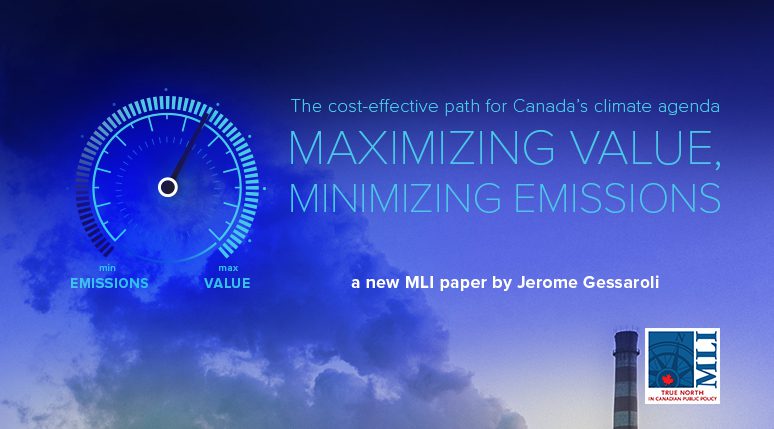By Jerome Gessaroli
June 27, 2023
Executive Summary
Since 2015, the federal government has spent or committed over $113 billion in climate related initiatives. Despite the funding, legislation, and implementation of all policies, regulations, and measures, Canada will still likely miss its 2030 emissions target by 48 percent. Consequently, the federal government risks heavily indebting Canadians without meeting its climate goals. For that reason, the government needs to rethink the money it spends and focus on policies that yield the greatest possible GHG abatement outcomes at the lowest cost.
This paper proposes a more cost-effective climate policy than many policies the government has implemented thus far – one that will reduce emissions more efficiently and provide socio-economic benefits to the parties involved.
Currently Canada – and many other countries – are overlooking the potential benefits of international collaboration. Countries that can cooperate using their comparative advantages, including technologies, lower costs, or mitigation opportunities, to reduce GHG emissions outside their territorial borders should receive credit for doing so. Rewarding emissions reductions from international collaboration can deliver more effective climate outcomes than solely focusing on domestic initiatives.
Article 6 of the 2015 Paris Agreement sets out the guidelines for such cooperative arrangements. Part 6.2 is particularly relevant. It allows countries to collaborate voluntarily on reducing GHG emissions and receive credit for emissions reductions beyond their political boundaries. Recognizing and encouraging market-based incentives create possibilities for more cost-effective emission abatement initiatives compared to those relying on government fiat alone.
Using methane abatement projects as an example, the total cost to complete those projects (that is, those costing under US $10 per tonne of CO2e) in Canada is about US $212 million. Doing so reduces Canadian CO2e emissions by 30,000 kilotonnes (kt). However, spending US $212 million on methane mitigation projects in Africa, Asia, and Canada will reduce global emissions by 55,000 ktCO2e, almost double the amount reduced if projects were limited to Canada.
Under Article 6.2, Canada can enter into arrangements with foreign countries to cost share or exchange our technical capabilities for mitigation benefits – in other words, by making such arrangements, Canada can reduce emissions globally while also receiving credit towards our formal climate targets under the Paris Agreement. These arrangements will lead to greater global emissions reductions with no increase in expenditure.
Creating cooperative climate initiatives with developing nations has second-order effects as well. For the developing country, the projects can transfer technology, expertise, and advanced processes helping to improve their overall economic development. The projects can lead to further international collaboration and partnerships in other areas. And depending upon the project, local benefits such as job creation, worker training, enhanced water quality, and improved economic productivity are possible extras over and above the emissions mitigation.
However, the federal government does not seem to have much appetite for using Article 6.2 to meet our greenhouse gas emission goals. Canada should look at cooperative emission reduction projects with other countries more seriously. We have abatement technologies across many sectors that other countries can use to generate meaningful GHG emission reductions – some of which Canada would use to meet its climate goals. But the government needs the political will to drive this new policy direction.







